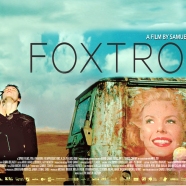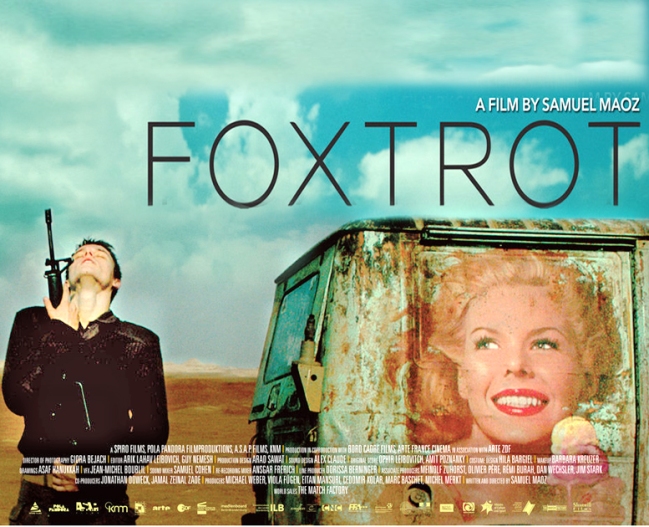 October
03
October
03
Tags
Foxtrot (2017)

The theme ‘war is absurd’ has become a cliché that tests the creativity of many a filmmaker. How many ways can you represent the random chaos of shattered lives and senseless destruction? The emotional rollercoaster Foxtrot (2017) hits the high-watermark in originality for the way it deploys grief, social critique, and absurdism to show a different side of war.
The film’s four acts defy the conventions of linear storytelling. In the opening seconds, a mother (Sara Adler) sees three soldiers at the door and before they can speak she collapses to the ground. With military precision, the doctor among them administers sedation and tells the father (Lior Askhkenazi) she will sleep for five hours; that’s usual, they say. When a son has fallen in the line of duty they expect the father to cope. They leave; another comes to plan just another funeral; then alone, the father furiously paces like a caged beast, crushed by his own emotions. In five hours they return with totally different news.
That plotline alone could fill a movie, but it is merely the first step of an absurdist dance with chaos that goes forward, across, back, then returns to the beginning. In the second act we meet the very much alive son Jonathan (Yonaton Shiray) who is stationed on an isolated checkpoint where the only intruders are camels that have trained the guards to open the boom-gate to let them pass. Bored out of their minds, the four teenage warriors tell each other stories, punctuated by Jonathan’s memorable foxtrot dance with his rifle as partner. The third and final acts complete this case study of random chaos; they include a scene one year later where the mother and father commiserate a tragedy and a dissolving marriage. The final seconds of the film match the opening in the way they erupt with the unexpected.
Undoubtedly, this film is anchored by the first 45 minutes in which Lior Askhkenazi gives a tour-de-force performance of going to hell and back. It is also a forensic satire that is beyond war clichés and that has infuriated the Israeli Military establishment. So much is being said in this film, with so few words spent. Small moments are jarring: like a father being told casually that his fallen son was promoted posthumously, as if he is worth more dead than alive, or the mechanically detailed way the military deals with death and bereavement. The camerawork and colour palette superbly set the mood of each act, and the asymmetry of the narrative reflects an alternative and absurdist universe in which war is normalised.
This is powerful cinema, the kind that can sweep you up with its characters, emotions, and story. Then, at the end of the film when the dance is done, you are left in disbelief at the banality of humanity. Watch for Foxtrotin Best Foreign Film award.

Director: Samuel Maoz
Stars: Lior Askhkenazi, Sara Adler, Yonaton Shiray

This film screened with the film society some weeks back. I have a vague memory of mentioning it in comments at the time. As you say, it defied linear viewing. Definitely broken into acts, almost disjointed at times, but with an intriguing story to tell. Oddly enough, some of the scenes that still stick strongly in my memory are the absurd elements of the camels, the slowly sinking quarters, the poor food and ennui. Then of course, those extremely dramatic moments which I won’t mention for fear of revealing plot spoilers.
LikeLiked by 1 person
I recall you mentioning it. Some have been critical of its non-linearity but for me this reflects the chaos of war. What did your film group make of it?
LikeLike
I don’t recall they loved it, but I think we all admired the set-up and message. We certainly dissected it and talked about it on the drive home!
LikeLiked by 1 person
A great first sentence and a fab review. Can’t wait to see this.
LikeLiked by 1 person
Thank you Christine; please come back when you see it and share your thougths.
LikeLike
Will do. Ready to post “ Lizzie” now.
The retro fit with modern mores just did not work.
LikeLike
This film was very well received by the film group I lead. It was quirky and at times difficult to fathom. Like the dance itself, events moved forwards and back again eventually ending where they began. There were so many tricky moments that watching it play out was like teasing out the clues to a puzzle.
I like this style of film making as opposed to the more usual, linear fare due to the feeling of satisfaction by having ‘figured it out’.
LikeLiked by 2 people
It does, like you say, play out as a puzzle. I admire the director’s risk-taking in using an asymmetrical four-act structure to accentuate the random chaos that war brings.
LikeLiked by 1 person
Yes, it does indeed. I was an audacious move because many would give up on the film before getting very far in. I’m glad most of us persevered.
Thanks for giving us a great review.
LikeLike
This one sounds like it’s all over the place. I love multi-layered stories, so this is right up my alley. Thanks, Richard, for another fine review.
LikeLiked by 1 person
I’d love to read your review if you get to see it Cindy.
LikeLike
Pingback: Favourites 2018 | CineMuseFilms